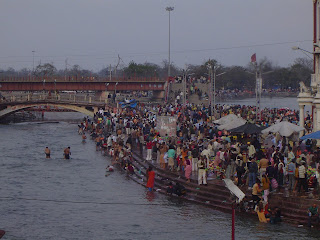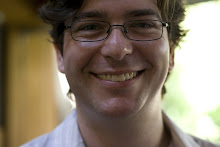Haridwar
Haridwar is a particularly holy city located where the Ganges suddenly emerges from the Himalayas. The flat land is thrust towards the heavens quite suddenly, without the usual rolling hills or slopes. Here the Ganges is big and fast-flowing, and, at the moment, a browned shade of very light blue. It is believed that Vishnu left a footprint here, so the city is deemed to be a particularly auspicious place to wash away ones sins. Pilgrims come to bathe and cast offerings into the Ganges at the ghats (steps), particularly the one known as Har-ki-Pairi (the Footstep of God). As luck would have it I arrived the day before a Shiv Ganga Yatra (pilgrimage day to do with Shiva), the same festival that kept me from getting to Varanasi.
As I found my way out of the train station I could see why Varanasi (even more holy) was out of the question. Thousands of pilgrims of all castes and economic situations choked the streets, often in large groups of whole families. Many were carrying little boat-like constructions that held candles. As I have discovered, India is a noisy place at the best of times, but the roar in Haridwar was deafening; people talking, yelling, and singing, horns blaring even more than usual (given the increased human traffic), and devotional music blasting from the various stalls set up to cater for the needs of every pilgrim.
After checking in to my hotel I took a deep breath and plunged back into the mass. It was, to say the least, overwhelming. A sight, smell, and sound overload as well as emotionally taxing. As I made my way through the lanes and bazaars it started to become too much. Finally, a small ghat appeared that wasn't too crowded, and I sat down. No sooner had I done so than a wrinkly old woman approached me, all smiles, and began chatting away in Hindi. Assuming she was begging I shook my head, whereupon she bent down and picked up a tray I hadn't noticed and painted a tikka on my forehead (picture to come). Perhaps I had wobbled my head instead of shaking. Anyway, I had only 3rs in coins on me which was apparently not enough (she wanted 5), and after a further 10mins of talking at me she left, grumpy, as did I.
More bazaars and more dizzying human bustle. Eventually I found myself at Har-ki-Pairi and stepped up onto the bridge to watch the religious action. Thousands of pilgrims bathed, splashed, dipped, and played in the Ganges. Most come to simply wash. fill up a little water bottle (which you buy nearby), and then leave. Some put little boats filled with lit candles in, while yet others cast various sacred offerings (some limb shaped - presumably to fix the real one).

As is always the case here, people come up and talk to you. One man said he had come from Nainital, 12 hours journey, and was going to throw his offering in then head straight back. He was hoping to arrive back to his home in time for work the next day.
Below me I noticed a family gathered around one of the holymen on hand. He was holding a lamp and waving it over a tray filled with a garland and a bowl filled with a grey material. As I watched prayers were said, and the mother began to weep gently. I realised that I was watching the final stage in a funeral, and quickly felt like a voyeur, unwelcome but left alone. I knew I had to watch though - as a student of religion and because it was clearly such a moving moment.
The prayers continued for some time, and the mother was joined in her open weeping by some of her daughters. Looking at the group more closely I realised that apart from the husband and a lone teenage boy, the rest were women, some 6 or 7 in all. The husband and the wife, in clean white, moved with the holy man to the banks. Crouching, some quick prayers were said and then everyone got up. Most of the women now wept openly, hanging onto each other. The holyman gave them a minute then motioned the adults to the water's edge again, and I now saw he was carrying a brown plastic urn. Crouching again, the three dipped their hands in the water and with a suddenness that shocked me the holyman upended the urn. As the Ganges turned grey around them the mourner's tears dried, though the on their faces was that look that all humans share in the face of grief. Without ceremony the holyman finished his duties by tossing the urn into the river, then got up and wandered away.
I was deeply moved by this and had forgotten the throng around me. Strangely, I felt as if I had been a part of the ceremony, as if I should be comforting the family too. Looking up at the diminishing space around me I had had enough, and went back to my hotel.
Haridwar is an odd town. I hate to say it, but I don't think I liked it. It felt like a place set up to take pilgrims money. The holiness of the place clearly isn't lost on the people who go there, but for me it simply didn't sit right. Aside from this there were almost no tourists, which meant I had no work to do.
The next day, I decided, I would head to Rishikesh.
As I found my way out of the train station I could see why Varanasi (even more holy) was out of the question. Thousands of pilgrims of all castes and economic situations choked the streets, often in large groups of whole families. Many were carrying little boat-like constructions that held candles. As I have discovered, India is a noisy place at the best of times, but the roar in Haridwar was deafening; people talking, yelling, and singing, horns blaring even more than usual (given the increased human traffic), and devotional music blasting from the various stalls set up to cater for the needs of every pilgrim.
After checking in to my hotel I took a deep breath and plunged back into the mass. It was, to say the least, overwhelming. A sight, smell, and sound overload as well as emotionally taxing. As I made my way through the lanes and bazaars it started to become too much. Finally, a small ghat appeared that wasn't too crowded, and I sat down. No sooner had I done so than a wrinkly old woman approached me, all smiles, and began chatting away in Hindi. Assuming she was begging I shook my head, whereupon she bent down and picked up a tray I hadn't noticed and painted a tikka on my forehead (picture to come). Perhaps I had wobbled my head instead of shaking. Anyway, I had only 3rs in coins on me which was apparently not enough (she wanted 5), and after a further 10mins of talking at me she left, grumpy, as did I.
More bazaars and more dizzying human bustle. Eventually I found myself at Har-ki-Pairi and stepped up onto the bridge to watch the religious action. Thousands of pilgrims bathed, splashed, dipped, and played in the Ganges. Most come to simply wash. fill up a little water bottle (which you buy nearby), and then leave. Some put little boats filled with lit candles in, while yet others cast various sacred offerings (some limb shaped - presumably to fix the real one).

As is always the case here, people come up and talk to you. One man said he had come from Nainital, 12 hours journey, and was going to throw his offering in then head straight back. He was hoping to arrive back to his home in time for work the next day.
Below me I noticed a family gathered around one of the holymen on hand. He was holding a lamp and waving it over a tray filled with a garland and a bowl filled with a grey material. As I watched prayers were said, and the mother began to weep gently. I realised that I was watching the final stage in a funeral, and quickly felt like a voyeur, unwelcome but left alone. I knew I had to watch though - as a student of religion and because it was clearly such a moving moment.
The prayers continued for some time, and the mother was joined in her open weeping by some of her daughters. Looking at the group more closely I realised that apart from the husband and a lone teenage boy, the rest were women, some 6 or 7 in all. The husband and the wife, in clean white, moved with the holy man to the banks. Crouching, some quick prayers were said and then everyone got up. Most of the women now wept openly, hanging onto each other. The holyman gave them a minute then motioned the adults to the water's edge again, and I now saw he was carrying a brown plastic urn. Crouching again, the three dipped their hands in the water and with a suddenness that shocked me the holyman upended the urn. As the Ganges turned grey around them the mourner's tears dried, though the on their faces was that look that all humans share in the face of grief. Without ceremony the holyman finished his duties by tossing the urn into the river, then got up and wandered away.
I was deeply moved by this and had forgotten the throng around me. Strangely, I felt as if I had been a part of the ceremony, as if I should be comforting the family too. Looking up at the diminishing space around me I had had enough, and went back to my hotel.
Haridwar is an odd town. I hate to say it, but I don't think I liked it. It felt like a place set up to take pilgrims money. The holiness of the place clearly isn't lost on the people who go there, but for me it simply didn't sit right. Aside from this there were almost no tourists, which meant I had no work to do.
The next day, I decided, I would head to Rishikesh.

No comments:
Post a Comment